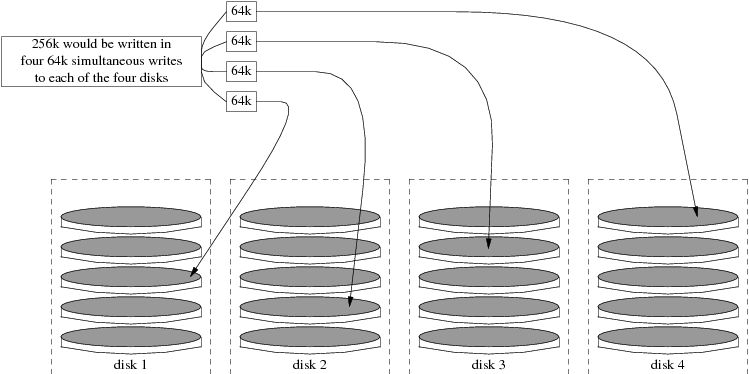20.3 RAID0 - Striping
Written by Tom Rhodes and Murray Stokely.Striping combine several disk drives into a single volume. In many cases, this is done through the use of hardware controllers. The GEOM disk subsystem provides software support for RAID0, also known as disk striping.
In a RAID0 system, data is split into blocks that get written across all the drives in the array. Instead of having to wait on the system to write 256k to one disk, a RAID0 system can simultaneously write 64k to each of four different disks, offering superior I/O performance. This performance can be enhanced further by using multiple disk controllers.
Each disk in a RAID0 stripe must be of the same size, since I/O requests are interleaved to read or write to multiple disks in parallel.

Creating a Stripe of Unformatted ATA Disks
-
Load the geom_stripe.ko module:
# kldload geom_stripe
-
Ensure that a suitable mount point exists. If this volume will become a root partition, then temporarily use another mount point such as /mnt:
# mkdir /mnt
-
Determine the device names for the disks which will be striped, and create the new stripe device. For example, to stripe two unused and unpartitioned ATA disks with device names of /dev/ad2 and /dev/ad3:
# gstripe label -v st0 /dev/ad2 /dev/ad3 Metadata value stored on /dev/ad2. Metadata value stored on /dev/ad3. Done.
-
Write a standard label, also known as a partition table, on the new volume and install the default bootstrap code:
# bsdlabel -wB /dev/stripe/st0
-
This process should create two other devices in /dev/stripe in addition to st0. Those include st0a and st0c. At this point, a file system may be created on st0a using newfs:
# newfs -U /dev/stripe/st0a
Many numbers will glide across the screen, and after a few seconds, the process will be complete. The volume has been created and is ready to be mounted.
To manually mount the created disk stripe:
# mount /dev/stripe/st0a /mnt
To mount this striped file system automatically during the boot process, place the volume information in /etc/fstab. In this example, a permanent mount point, named stripe, is created:
# mkdir /stripe
# echo "/dev/stripe/st0a /stripe ufs rw 2 2" \
>> /etc/fstab
The geom_stripe.ko module must also be automatically loaded during system initialization, by adding a line to /boot/loader.conf:
# echo 'geom_stripe_load="YES"' >> /boot/loader.conf